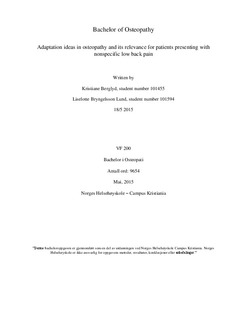Adaptation ideas in osteopathy and its relevance for patients presenting with nonspecific low back pain
Bachelor thesis
Permanent lenke
http://hdl.handle.net/11250/426535Utgivelsesdato
2015-09-29Metadata
Vis full innførselSamlinger
Sammendrag
A substantial amount of patients, seeking primary health care, suffer from conditions where a clear pathological lesion cannot be found. These conditions, categorized as medically unexplained symptoms, can cause disability with the same severity as those that originate from organic pathology. Nonspecific low back pain is one of the many conditions categorized as medically unexplained symptoms. Many attempts have been made to find the cause of the problem, but there is no common consensus regarding causal factors existing today. Researchers on Medically Unexplained Symptoms (MUS) criticize the foundational ideas of reductionism, dualism and linear cause-effect relationships in health care sciences because it fails to include individual variety and context sensitivity. A new ontological model is needed that can be an alternative to the separation of physiological and psychological processes, and the one-dimensional tendency to solely explain illness/disease from the micro level. We will explain why the foundational assumptions following the biomedical model do not work well when approaching patients that suffer from MUS. Further we will describe the prevalence, management and suggested pathology of NSCLBP and relate this to stress-physiology and allostatic load. Finally we will present the foundational idea of adaptation and explain how emphasizing the adaptive ability of the individual can embrace both context sensitivity and individual variety, and be a holistic alternative to reductionism.
